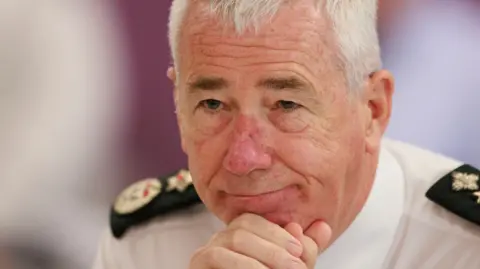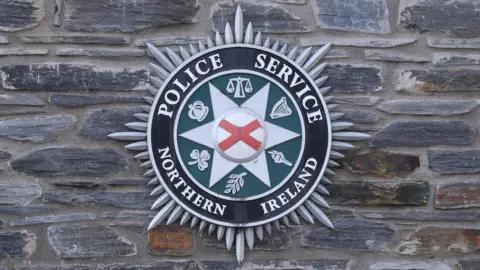Catholic applications to join PSNI 'below what's needed'
 PA Media
PA MediaChief Constable Jon Boutcher has said the number of Catholics who have applied to join the Police Service of Northern Ireland (PSNI) is below what it needs to be.
A new recruitment campaign, which ends on Wednesday, has so far attracted a total of 3,500 applications.
Twenty-seven percent are from a Catholic background.
Mr Boutcher told BBC News NI: "The figures are not what I want. There is no doubt about that. But Rome wasn't built in a day."
 PA Media
PA MediaThe PSNI does not reflect the composition of society in several areas, it has too few women officers, as well as those from ethnic minority backgrounds.
Sixty-six percent of its 6,300 officers are "perceived" as Protestants, according to its own data.
Between 2001 and 2011 there was a 50-50 recruitment initiative which meant there was one Catholic recruit for every one person from a Protestant or other background.
Since then, there has been no legislation to address the issue.
The new recruitment campaign is the first since 2021.
Applications are below the last two recruitment drives, which attracted 5,300 and 6,900 applicants respectively.
Mr Boutcher said the drop in applications was "mirroring" difficult recruitment campaigns by other forces, such as the Metropolitan Police.
He added what is more important is a need to be a better representative of the Northern Ireland community.
"It's a tough challenge, but it's one we are up for," he said.
Legacy issues
He said he believed the legacy issue continues to impact on numbers of Catholic applicants.
"I think if you are paying attention to what this organisation is now doing around information provision on legacy cases… I think if the nationalist community was to look at that, I think they would see a different side to what we're trying to do," Mr Boutcher said.
"Those things don't land in a day. Those things take time for people to see.
"There will always be suspicions, but I think over the next three years, and this is going to be the test for us, if we can see those numbers increase, that's my challenge.
"That's what I will be judged on."
The chief constable wants to lift current officer numbers from 6,300 to 7,000 by 2028.
But he is still awaiting Stormont approval for an extra £200m he needs to address recruitment.
He said politicians were sympathetic to the situation.
"They are listening and they, I think, understand more now than the have ever understood because we are explaining it in a way that is incredibly compelling," the chief constable said.
"What I'm saying is 'enough is enough' and the politicians are listening to that and are sympathetic to that.
"I'm asking for a three-year plan so that we can recover our numbers to 7,000, which is still very much not what we need.
"But it's a starting position and it would allow us to keep people safe otherwise than we would be able to do."
'Hill to climb'
The Chair of the Police Federation for Northern Ireland Liam Kelly said "major societal changes" are required to encourage more Catholics to apply to become police officers.
"Potential applicants must get to the point where they can seek a career in policing without suffering intimidation or threats.
"Applicants should not feel they are going to lose their family networks or their friends but, sadly, too many feel that is exactly what would happen if they became police officers," Mr Kelly said.
He added that the PSNI recruitment figures showed there was still "a hill to climb" when it came to attracting numbers that more accurately reflected the wider population.
